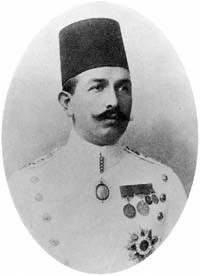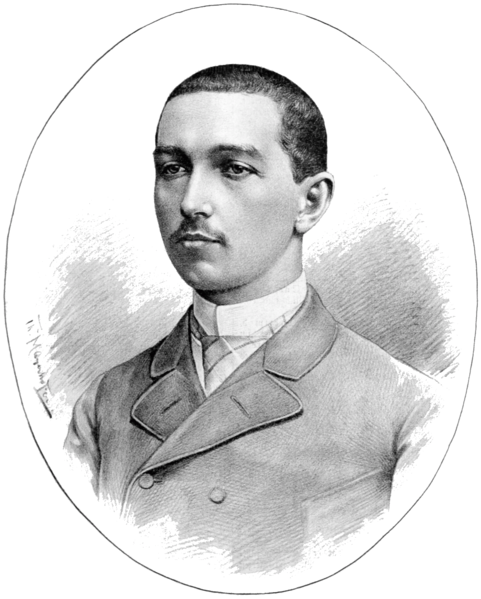<Back to Index>
- Khedive of Egypt and Sudan Abbas Hilmi Pasha, 1874
PAGE SPONSOR


HH Abbas II Hilmi Bey (also known as Abbas Hilmi Pasha) (Arabic: عباس حلمي باشا) (14 July 1874 - 19 December 1944) was the last Khedive of Egypt and Sudan (8 January 1892 - 19 December 1914).
Abbas II was the great - great - grandson of Muhammad Ali, was born on 14 July 1874. He succeeded his father, Tewfik Pasha, as Khedive of Egypt and Sudan on 8 January 1892. As a boy he visited the United Kingdom, and he had a number of British tutors in Cairo including a governess who taught him English. In a profile of Abbas II, the boys' annual Chums gives a lengthy account of his education. His father established a small school near the Abdin Palace where European, Arab and Turkish masters taught Abbas and his brother Prince Mehemet Ali. An American officer in the Egyptian army took charge of his military training. At the age of twelve he was sent to the Haxius School in Geneva, in preparation for his entry into the Theresianum in Vienna. In addition to Arabic and Turkish, he had good conversational knowledge of English, French and German.
He was still in college in Vienna when he assumed the throne of the Khedivate of Egypt upon the sudden death of his father. He was barely of age according to Egyptian law; eighteen in cases of succession to the throne. For some time he did not cooperate very cordially with the United Kingdom, (whose army had occupied Egypt in 1882). As he was young and eager to exercise his new power, he resented the interference of the British Agent and Consul General in Cairo, Sir Evelyn Baring, later made Lord Cromer. At the outset of his reign, Khedive Abbas surrounded himself with a coterie of European advisers who opposed the British occupation of Egypt and Sudan and encouraged the young Khedive to challenge Cromer by replacing his ailing prime minister with a nationalist. At Cromer's behest, Lord Roseberry, the British foreign secretary, sent him a letter stating that the Khedive was obliged to consult the British consul on such issues as cabinet appointments. In January 1894 Abbas, while on an inspection tour of Egyptian army installations near the southern border, the Mahdists being at the time still in control of Sudan, made public remarks disparaging the Egyptian army units commanded by British officers. The British commander of the Egyptian army, Sir Herbert Kitchener, immediately offered to resign. Cromer strongly supported Kitchener and pressed the Khedive and prime minister to retract the Khedive's criticisms of the British officers.
From that time on, Abbas no longer publicly opposed the British, but secretly created, supported, and sustained the nationalist movement, which came to be led by Mustafa Kamil. As Kamil's thrust was increasingly aimed at winning popular support for a National Party, Khedive Abbas publicly distanced himself from the Nationalists. However in general he had no real political power. When the Egyptian Army was sent to fight the Madhi he only found out about it because the Austro - Hungarian Archduke Francis Ferdinand was in Egypt and told him after being informed by a British Army officer about it.
In time he came to accept British counsels. In 1899 British diplomat Alfred Mitchell - Innes was appointed Under Secretary of State for Finance in Egypt, and in 1900 Abbas paid a second visit to Britain, during which he said he thought the British had done good work in Egypt, and declared himself ready to cooperate with the British officials administering Egypt and Sudan. The establishment of a sound system of native justice, the great remission of taxation, the reconquest of Sudan, the inauguration of the substantial irrigation works at Aswan, and the increase of cheap, sound education, each received his formal approval. He displayed more interest in agriculture than in statecraft. His farm of cattle and horses at Qubbah, near Cairo, was a model for scientific agriculture in Egypt, and he created a similar establishment at Muntazah, near Alexandria. He married the Princess Ikbal Hanem and had several children. Muhammad Abdul Mun'im, the heir apparent, was born on 20 February 1899.
His relations with Cromer's successor, Sir Eldon Gorst,
were excellent, and they co-operated in appointing the
cabinets headed by Butrus Ghali in 1908 and Muhammad Sa'id
in 1910 and in checking the power of the Nationalist
Party. The appointment of Kitchener to succeed Gorst in
1911 displeased Abbas, and relations between him and the
British deteriorated. Kitchener often complained about
"that wicked little Khedive" and wanted to depose him.
When the Ottoman Empire joined the Central Powers in World
War I, the United Kingdom declared Egypt an independent
Sultanate under British protectorate on 18 December 1914
and deposed Abbas. Abbas supported the Ottomans in the
war, including leading an attack on the Suez Canal. His
uncles Hussein Kamel and then Fuad
I, the British choices for their Protectorate,
issued a series of restrictive orders to strip Abbas of
property in Egypt and Sudan and forbade contributions to
him. These also barred Abbas from entering Egyptian
territory and stripped him of the right to sue in Egyptian
courts. Abbas finally accepted the new order of things on
12 May 1931 and abdicated. He retired to Switzerland where
he died at Geneva on 19 December 1944, aged 70.
He married firstly in Cairo on 19 February 1895 Crimean Ikbal Hanim (Crimean Peninsula, 22 October 1876 - Jerusalem, 10 February 1941) and had six children:
- HH Princess Emine Hilmi Khanum Efendi (Montaza Palace, Alexandria, 12 February 1895 - 1954), unmarried and without issue;
- HH Princess Atiye Hilmi Khanum Efendi (Cairo, 9 June 1896 - 1971), unmarried and without issue;
- HH Princess Fethiye Hilmi Khanum Efendi (27 November 1897 - 30 November 1923), unmarried and without issue;
- HH Prince/HRH Prince Muhammad Abdel Moneim Bey Efendi, Heir Apparent and Regent of Egypt and Sudan;
- HH Princess Lütfiye Şevket Hilmi (Cairo, 29 September
1900 - ?), married in Istanbul on 5 May 1923 to
Omar Muhtar Katırcıoğlu (1902 - Çamlıca, near Üsküdar,
Bosphorus, 15 July 1935), and had issue:
- Emine Neşedil Katırcıoğlu (b. 1927), unmarried and without issue;
- Zehra Kadriye Katırcıoğlu (Istanbul 12 March 1929 - Istanbul 15 May 2012), married Ahmet Cevat Tugay have 4 sons and a daughter;
- HH Prince Muhammed Abdel Kader (4 February 1902 - Montreux, 21 April 1919).
He married secondly at Çubuklu, Bosphorus, on 1 March 1910 and divorced in 1913 Hungarian Noblewoman Marianne Török de Szendrö, who took the name Zübeyde Cavidan Hanım (Philadelphia, Philadelphia County, Pennsylvania, 8 January 1874 - aft. 1951), without issue.